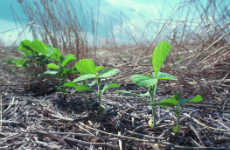Dr. Mark Rosegrant, Director of the Environment and Production Technology Division of the International Food Policy Research Institute (IFPRI) will be presenting the results of a new report, Food Security in a World of Natural Resource Scarcity.
The study measures the impacts of agricultural innovation on farm yields, prices, hunger, and trade under various climate scenarios in 2050, and identifies practices that could significantly benefit developing nations. Using a first-of-its-kind data model, IFPRI examines 11 agricultural practices and technologies and how they could help farmers around the world improve the productivity and sustainability of growing three of the world’s main staple crops – maize, rice, and wheat.
The technologies profiled are: crop protection, drip irrigation, drought tolerance, heat tolerance, integrated soil fertility management, no-till farming, nutrient-use efficiency, organic agriculture, precision agriculture, sprinkler irrigation, and water harvesting. Report findings indicate that targeted application of key technologies such as no-till, heat tolerance, and crop protection can significantly increase developing world yields and slash food prices by 2050.
Dr. Rosegrant will also showcase the Agritech Toolbox, a comprehensive online tool that allows users to explore the results of the study and visualize where different technologies can improve global, regional, and national food security and sustainability.
The study measures the impacts of agricultural innovation on farm yields, prices, hunger, and trade under various climate scenarios in 2050, and identifies practices that could significantly benefit developing nations. Using a first-of-its-kind data model, IFPRI examines 11 agricultural practices and technologies and how they could help farmers around the world improve the productivity and sustainability of growing three of the world’s main staple crops – maize, rice, and wheat.
The technologies profiled are: crop protection, drip irrigation, drought tolerance, heat tolerance, integrated soil fertility management, no-till farming, nutrient-use efficiency, organic agriculture, precision agriculture, sprinkler irrigation, and water harvesting. Report findings indicate that targeted application of key technologies such as no-till, heat tolerance, and crop protection can significantly increase developing world yields and slash food prices by 2050.
Dr. Rosegrant will also showcase the Agritech Toolbox, a comprehensive online tool that allows users to explore the results of the study and visualize where different technologies can improve global, regional, and national food security and sustainability.
Date
2014-03-26

